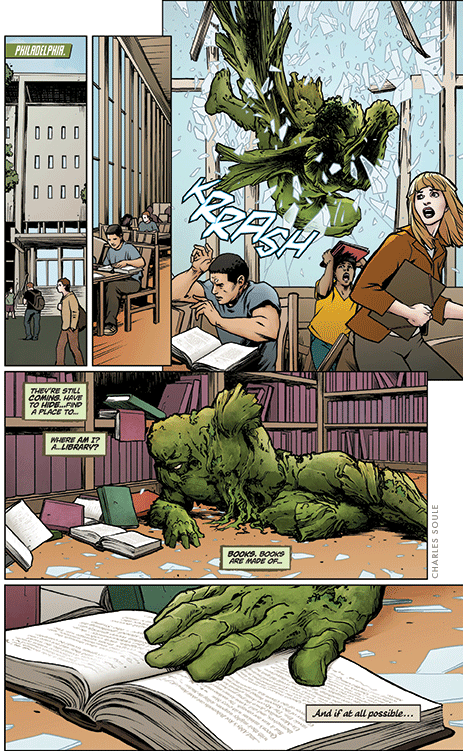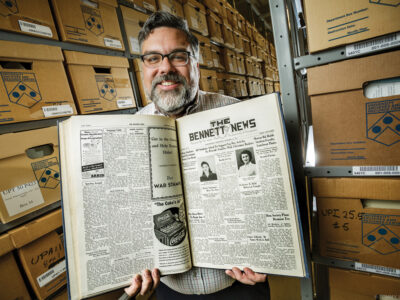
Class of ’96 | Nowadays, Charles Soule C’96 finds himself practicing law less and chronicling the adventures of superheroes more. Not only is he one of the creators instrumental in making Superman and Wonder Woman a romantic couple in DC Comics’ Superman and Wonder Woman, he also killed off Wolverine—one of Marvel’s most popular characters—in 2014’s blockbuster mini-series The Death of Wolverine.
“I think it’s important to respect what’s come before, but they’re all just characters,” says Soule, whose work can be seen at www.charlessoule.com. “Really great characters, but if you start treating them like icons, you can’t get good stories out of them. Find the ways they’re like people—not gods—and that’s when things start to work.”
Making Superman and Wonder Woman DC’s definitive power couple was a controversial move on the publisher’s part, since longtime fans could hardly imagine Superman with anyone but Lois Lane. (Those two haven’t been an item since DC revived the characters in 2011.)
“The nice thing is, once people started reading the book, all of that died away, which is exactly the reaction you want,” says Soule. “I was thrilled to delve into their relationship in a new way.”
When Marvel asked him to write The Death of Wolverine, he jumped at the chance.
“Getting a chance to write a final chapter in the fictional life of a gigantic character like Wolverine doesn’t come around every day,” he says.
“I was thrilled to do it.”
Of course, even though Marvel had been building up to Wolverine’s death for two years (he lost his healing factor, which had made him virtually immortal), the process of killing off a once-unkillable character felt somewhat surreal to Soule. And the way Wolverine died—a molten metal alloy was dumped on him, suffocating him—elicited angry blowback from fans, who wanted him to go out in a blaze of glory. Soule was OK with that.
“I’m not sure why you would want to please everyone in any case,” he says. “There was no way to do a story like that and make every Wolverine fan happy—I mean, their guy is going away for a while.” (Read into that phrasing what you will.) “Unhappiness is part of the equation,” Soule adds. “But this Wolverine fan was very happy with that story.”
A Milwaukee native, Soule grew up reading comic books, most notably DC’s Batman: The Dark Knight Returns, The Sandman, Swamp Thing, and his all-time favorite, Preacher.
“I try to read a bit of pretty much everything,” he says, “and I read a lot of what I love.”
In March’s final issue of Swamp Thing, Soule brought his love for Swamp Thing and his love for his alma mater together in a most dramatic way. At the urging of his friend David Toccafondi C’95 CGS’02, coordinator of the Vitale Digital Media Lab at Van Pelt Library, Soule didn’t just pit Swamp Thing against the Machine Queen’s evil forces. He also set the scene in Van Pelt.
“I had suggested to him for a while that Swamp Thing should pay a visit to Van Pelt Library,” says Toccafondi. “It was fantastic! I knew it was his last issue, and the fact that [it was set in the library] was great. I’m a big Swamp Thing fan—I have a statue in my office—and a big Charles fan.”
Soule’s wide-ranging interests were evident during his undergraduate years at Penn, where he majored in Asian and Middle Eastern studies with a focus on Chinese history and language, and minored in music composition.
After graduating from Columbia University Law School in 2000, Soule spent a few years working for different law firms before hanging out his shingle in Brooklyn in 2004. He specializes in immigration law, although he’s been trained in business and transactional law.
“I still practice law, in part because it’s a business I built myself—I’m proud of it, and I like my clients very much,” he says. “Immigration is an area of law where you can directly influence peoples’ lives—say through obtaining a marriage-based green card so a couple can be together—and I enjoy that. Writing is wonderful, too, of course, but law is certainly not drudgery for me. When I got out of law school I knew I wanted to keep on with creative work. Writing—which eventually became my current comics work—seemed like a great way to do that.”
He broke into comics over a period of five years through networking and persistence. His first professional work was his graphic novel Strongman (SLG Publishing).
“While it wasn’t a gigantic success commercially, it had just enough impact to get me through a few doors that had been previously closed to me,” he says. “Each project leads to the next, if you do it right.”
One of those doors was at Image Comics, which gave him the opportunity to write Twenty-Seven—a project he describes as “House of Cards meets Alien, more or less.” In it, the president of the United States learns that the previous administration knew about an alien presence and covered it up. Now he’s got to deal with it.
“It was right around the time of the last space-shuttle launch,” says Soule. “I was frustrated that the US had discontinued manned space exploration, and started thinking about what might get us back out there. The idea came to me that the discovery of aliens in the asteroid belt would probably do it.”
Twenty-Seven has been optioned by the SyFy Channel for a TV series, though that’s as far as it’s gotten.
“It’ll appear when it appears,” says Soule. “TV and film move at their own speed—but seeing [these characters] on a screen of any size would be great.”
Currently, Soule is writing two comics for Marvel: She-Hulk and Inhuman.
Being a lawyer has helped him chronicle the adventures of She-Hulk, whose day-persona is attorney Jennifer Walters, the Hulk’s younger cousin. Marvel wanted to focus more on her in the courtroom than the battlefield.
“I’m the first lawyer to write the title, for better or for worse,” he says. “I think She-Hulk has been blessed with some incredibly strong writers before me, and each brought something wonderful to it. She-Hulk’s office happens to be located in the building in Brooklyn where I have my office. I bring a lot of my legal-world experiences to the book.”
Being a lawyer, he adds, has also sharpened his skills as an author: “I can work on a story for a long time—not stand up until it’s done—just as I might a legal brief. I like to make sure my books have an internal logic, too, and I think that comes from my legal practice as well.”
Soule makes a strong case that writing comics is the best job in the world.
“It’s a very open, creative form,” he says. “Any comic has the same gigantic imagery available to it as your biggest budget film, but it costs just a tiny fraction. So the oversight isn’t quite as draconian as it might otherwise be in a pricier art form. It’s also very merit-focused in many ways. Strong work tends to get recognized, which is nice. Plus, I grew up loving to read comics, and it seemed like a pretty plausible extrapolation that I might love making them as well.”
—Kurt Anthony Krug




